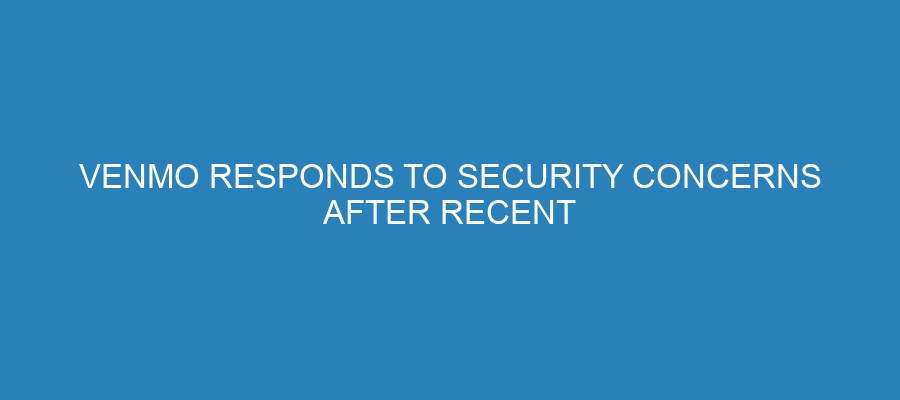Venmo Responds to Security Concerns After Recent Breaches: Is Your Money Safe?
Venmo, the ubiquitous peer-to-peer payment app, has revolutionized how we split bills, pay for groceries, and even send gifts. Its social feed, ease of use, and mobile-first approach have made it a cultural phenomenon. However, its popularity has also made it a prime target for cybercriminals. Recent reports of account breaches and fraudulent activity have raised serious security concerns, forcing Venmo to respond with updates and assurances. But are these measures enough to truly protect your money and personal information?
For years, Venmo’s convenience came at the cost of inherent visibility. The default setting allowed transactions to be publicly viewable, creating a goldmine of data for scammers to analyze patterns, identify potential victims, and even glean personal information. While Venmo has since made privacy settings more prominent and easier to manage, the legacy of publicly shared data persists.
The recent breaches, however, highlight more sophisticated threats than just relying on public data. Phishing scams, where fraudsters impersonate Venmo or other trusted entities to trick users into divulging login credentials, are increasingly prevalent. Sophisticated malware can also intercept login information and grant unauthorized access to accounts.
Furthermore, chargeback scams are becoming a growing problem. Scammers will use stolen credit cards or fraudulent bank accounts to send payments via Venmo, then quickly withdraw the funds before the legitimate account holder realizes the fraudulent activity. Venmo users, often unaware of the illicit origin of the funds, can find themselves facing legal repercussions or having their accounts suspended.
In response to these mounting concerns, Venmo has implemented several measures aimed at bolstering security. These include:
- Two-Factor Authentication (2FA): This adds an extra layer of security by requiring a unique code, usually sent to your phone, in addition to your password. While 2FA has been available for some time, Venmo is now strongly encouraging its users to enable it.
- Enhanced Account Monitoring: Venmo claims to be utilizing more sophisticated algorithms to detect suspicious activity and flag potentially fraudulent transactions. This includes monitoring for unusual transaction patterns, location discrepancies, and attempts to access accounts from unfamiliar devices.
- Improved Fraud Education: Venmo is investing in user education to help people identify and avoid phishing scams and other fraudulent activities. This includes in-app notifications, email alerts, and online resources.
- Stronger Security Protocols: Venmo has committed to continuously updating its security protocols and infrastructure to stay ahead of evolving threats. This includes employing encryption and other advanced security technologies.
These efforts are a step in the right direction, but experts argue that more needs to be done. Many advocate for stronger identity verification processes, stricter transaction limits, and more responsive customer support when users report fraudulent activity. The slow response times and difficulty reaching human support agents remain a significant point of frustration for many users who have fallen victim to scams.
The challenge for Venmo lies in balancing security with user experience. While implementing more stringent security measures might deter some criminals, it could also make the app less convenient to use and potentially alienate some users. Finding the right balance is crucial for maintaining its popularity while effectively safeguarding user funds and data.
For businesses considering accepting Venmo as a payment option, understanding these security concerns is paramount. While Venmo is convenient for peer-to-peer transactions, it’s not necessarily designed for commercial use and may lack the robust fraud protection features offered by traditional payment processors. Businesses should consider partnering with reliable merchant processing providers like PaymentCloud Inc., which offers a range of secure and compliant payment solutions.
FAQs
Q: Is Venmo safe to use?
A: While Venmo has implemented security measures, it’s not completely immune to fraud. Users should be vigilant and take precautions to protect their accounts.
Q: What can I do to protect my Venmo account?
A: Enable two-factor authentication, use a strong and unique password, be wary of phishing scams, and regularly monitor your account activity. Never send money to someone you don’t know or trust.
Q: What should I do if I suspect my Venmo account has been compromised?
A: Immediately change your password, report the suspicious activity to Venmo, and contact your bank or credit card company if necessary.
Q: Does Venmo offer any fraud protection for businesses?
A: Venmo’s fraud protection is primarily geared towards personal use and may not be sufficient for businesses. Businesses should consider using a dedicated merchant processing solution.
Q: Can I get my money back if I’m scammed on Venmo?
A: It depends on the specific circumstances. Venmo may be able to refund your money if you report the fraud promptly, but there’s no guarantee.
Q: What are the risks of using Venmo for business transactions?
A: Higher risk of fraud, potential for chargeback scams, and limited fraud protection compared to traditional merchant processing.
Q: Is there a difference between using Venmo to pay a merchant via their Venmo account or using a payment processor like Authorize.net?
A: Yes, there is a substantial difference. Venmo accounts are not designed for commercial use, therefore do not offer any support or coverage for commercial transactions. A payment processor such as Authorize.net and others provide fraud protection, compliance and the proper framework for commercial transactions.
Conclusion
Venmo’s popularity and convenience make it an attractive target for fraudsters. While the company is taking steps to address security concerns, users need to remain vigilant and take proactive measures to protect their accounts. For businesses, relying solely on Venmo for payment processing can be risky. Consider exploring alternative solutions that offer robust security features and fraud protection.
If you are a business owner and need help getting merchant processing for your business, contact Payminate.com today for a consultation. They can help you find the right payment solution to protect your business and your customers.

